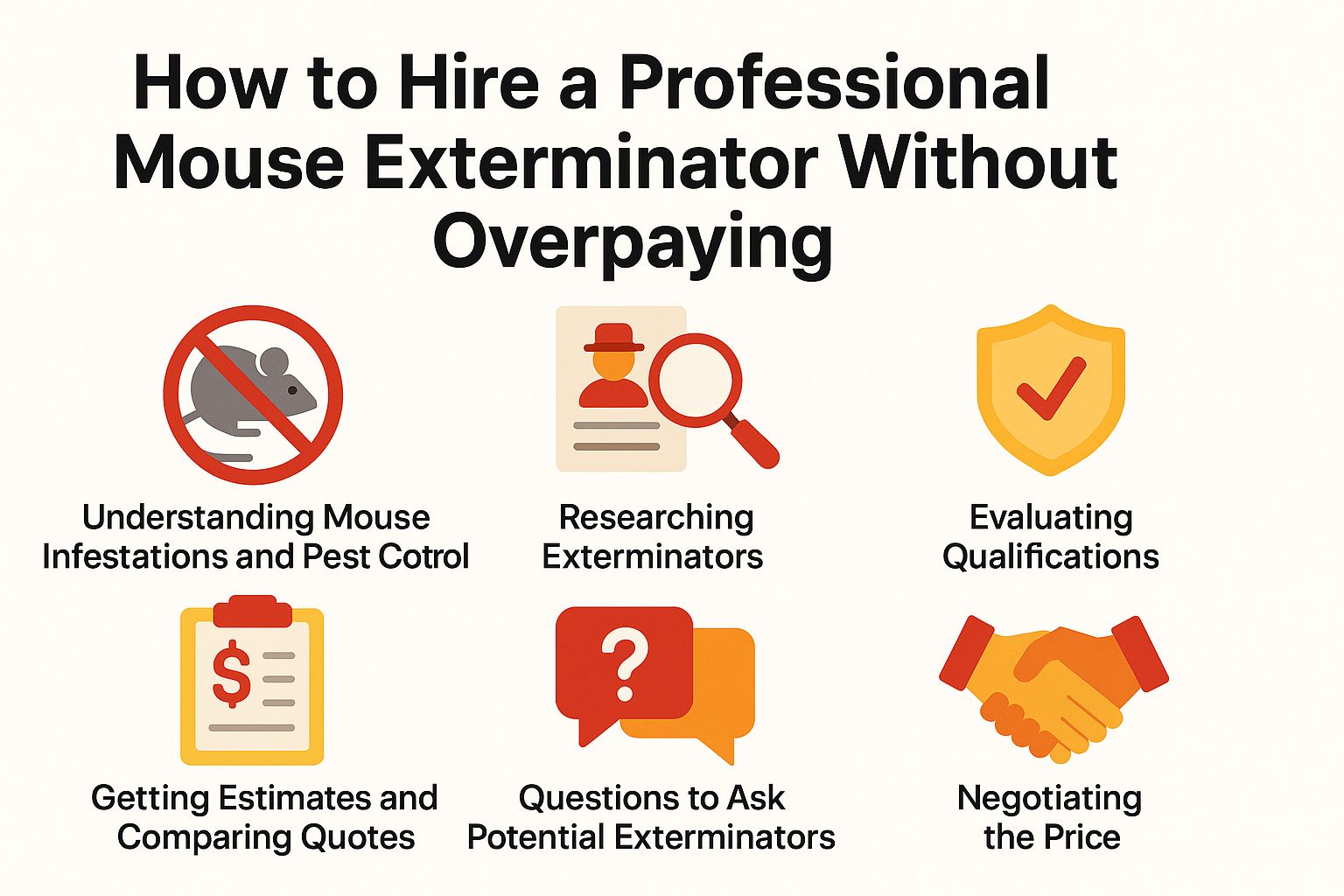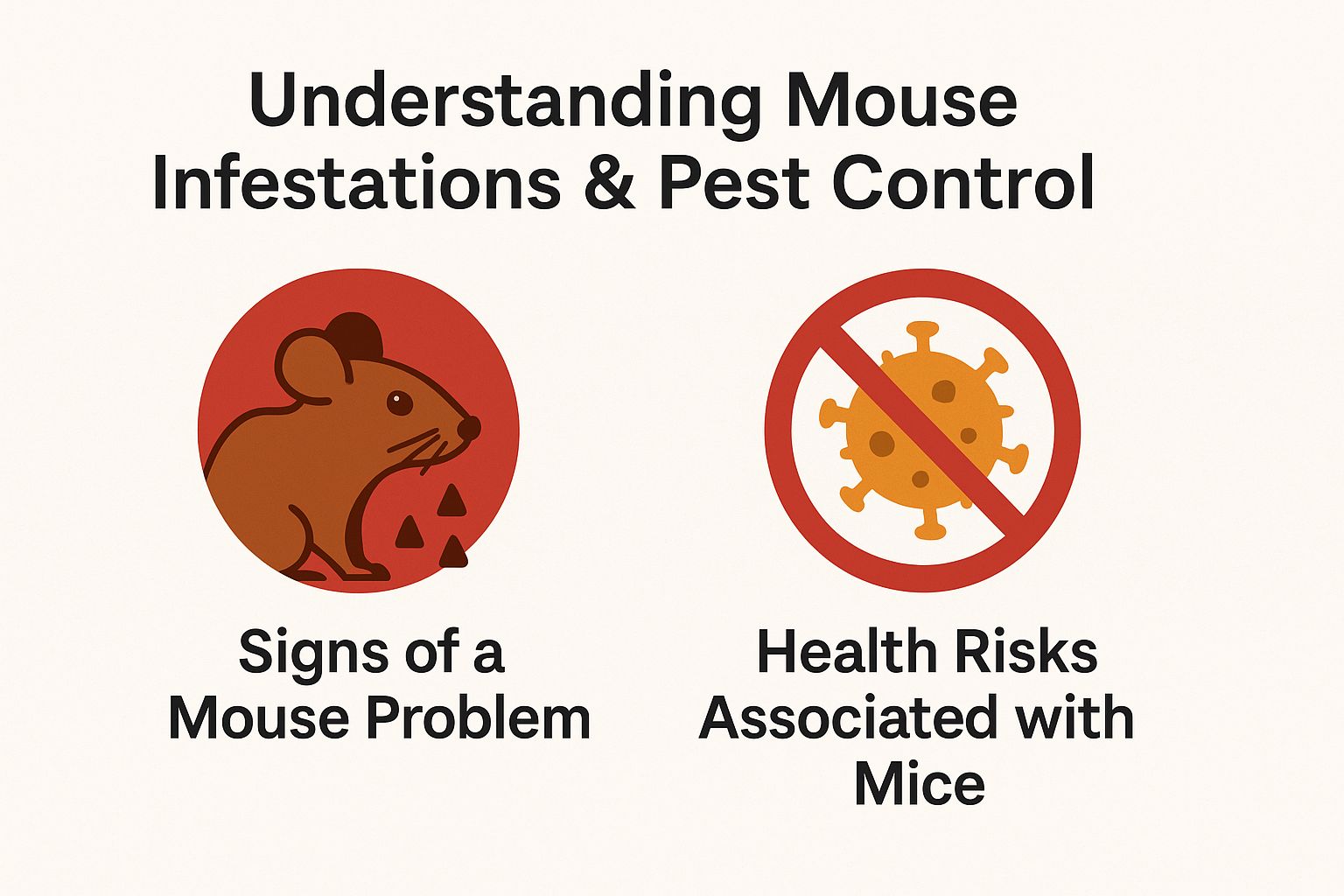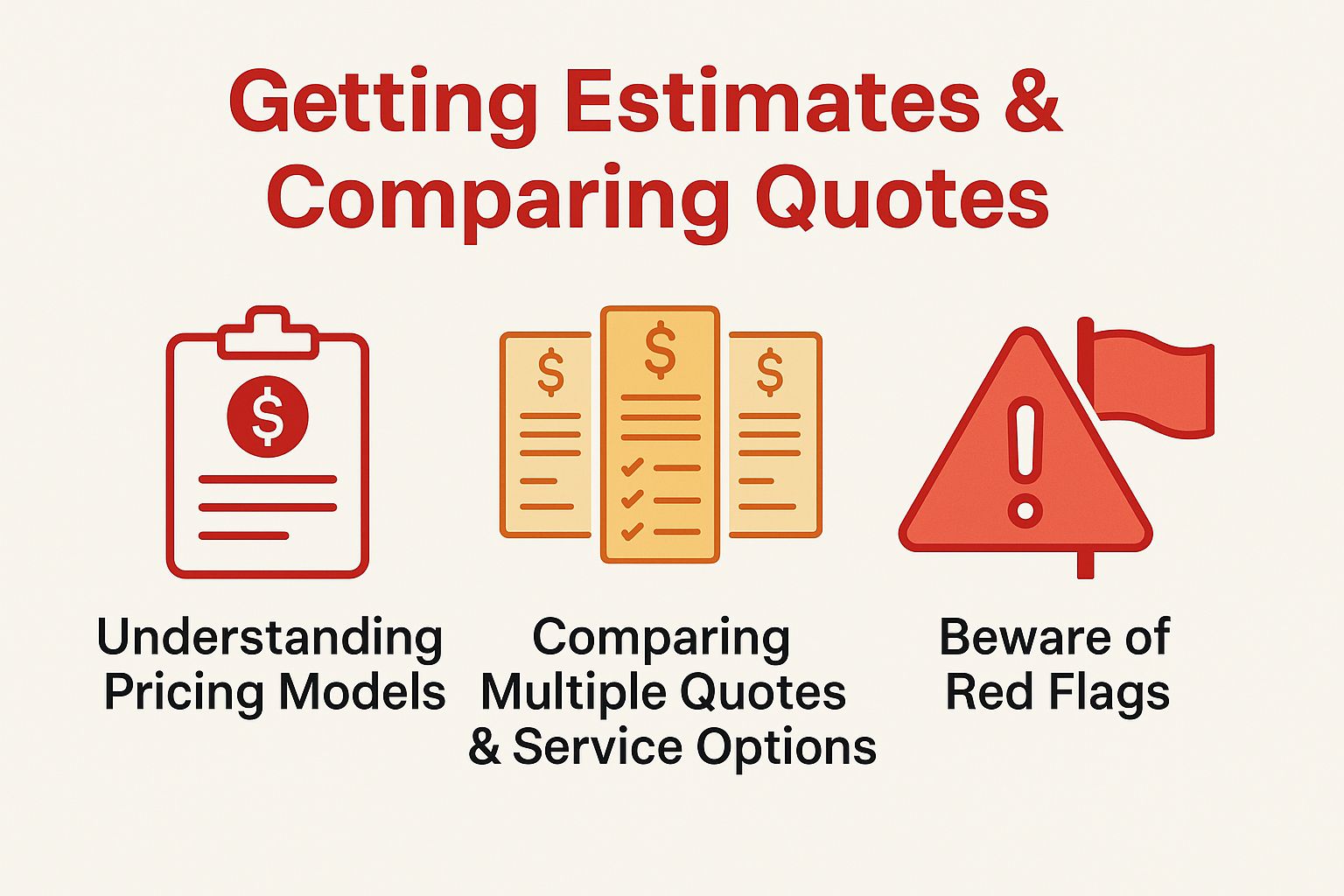
How to Hire a Professional Mouse Exterminator Without Overpaying
Mice in your home can feel like an invasion, but hiring a professional mouse exterminator doesn’t have to break the bank. Knowing the right steps can help you regain control without overpaying. You will learn about the dangers of doing pest control yourself, how to assess professional pest control services, and get useful advice for getting a good deal. We will also show you how to avoid extra charges that are not obvious. Ready to keep your space mouse-free while staying within your budget? Let’s dive in!
Importance of Hiring a Professional Exterminator
Experts have specific training, certifications, and tools that improve their ability to handle mouse infestations better than do-it-yourself approaches. Their skills provide affordable and practical solutions.
For instance, their knowledge of behavior patterns allows them to identify entry points and nesting sites that homeowners might overlook.
Certified pest control technicians often use specialized products like rodenticides, which the public cannot access, ensuring they work better.
They can put in place detailed management strategies, covering removal, cleaning, and regular checks, beyond just using basic traps.
By choosing a professional service like Terminix or Orkin, homeowners can feel confident that trained experts will create solutions designed for their properties.
Risks of DIY Mouse Control
Dealing with a mouse issue by yourself can lead to bad outcomes, health risks, and costly mistakes, making the problem grow.
Many DIY attempts fail due to improper techniques. For example, setting traps without knowing how mice behave can make them ineffective.
A common pitfall is using the wrong bait; peanut butter typically outperforms cheese because it’s stickier and more aromatic. Insufficient sanitation can attract rodents, as food debris and clutter provide hiding spots.
Rather than attempting DIY fixes, consider consulting pest control professionals who can assess the extent of the problem and implement targeted strategies, ensuring a more effective resolution.
Learning About Mouse Problems and Pest Management
Identifying the signs and knowing the health risks of mouse infestations are important for managing and preventing them effectively. For those wondering how to get rid of mice in your home, understanding the right methods can make a significant difference in addressing the issue promptly.

Signs of a Mouse Problem
Key indicators of a mouse infestation include droppings, gnaw marks, nests, and strange noises, which can often go unnoticed at first.
To effectively confirm a mouse infestation, look for specific signs.
- Droppings resemble small black pellets and are usually found near food sources or nesting areas.
- Gnaw marks can appear on food packaging, baseboards, or wires, indicating foraging behavior.
- Nests are often constructed from soft materials like shredded paper or fabric, hidden in corners or behind appliances.
If you hear scratching or scampering noises during the night, it may signal active mice. Acting quickly by blocking openings and placing traps can stop the issue from getting worse.
Health Risks Associated with Mice
Mice can carry diseases such as hantavirus, leptospirosis, and salmonella, which pose serious health risks to both humans and pets.
These diseases can spread through droppings, urine, or saliva and may cause serious health problems. For example, hantavirus can cause a potentially fatal respiratory disease.
To reduce these risks, hire a professional pest control service, since they have the knowledge and equipment required to completely remove infestations.
Services often utilize methods like:
- Rodent baiting
- Methods to block access later
Regular inspections and sanitation measures, such as sealing entry points and maintaining clean environments, are also essential to minimize the likelihood of mice returning.
Researching Exterminators
It’s important to carefully check pest control services to make sure you hire a qualified exterminator who meets your needs. For those looking to delve deeper into this topic, our expert tips on choosing the right pest control service offer valuable insights.

Types of Pest Control Services and Extermination Methods
Common pest control services include chemical treatments, traps, and eco-friendly methods, each varying in effectiveness and application.
Chemical treatments, such as insecticides and pesticides, are often effective for widespread infestations. They can have environmental impacts and may pose health risks to humans and pets.
On the other hand, traps are suitable for localized problems, like rodent control, but require regular monitoring and may not address root causes.
People who want environmentally friendly options can use eco-friendly solutions like diatomaceous earth or essential oil sprays, though they might need to apply them more often.
Pick according to how serious the infestation is and what you prefer for the environment.
Online Reviews and Ratings for Extermination Services
Using platforms like Yelp and Google Reviews can give you opinions about how dependable and good local exterminators are based on what customers say.
To effectively use online reviews, start by filtering for recent feedback to gauge current performance. Look for patterns in comments regarding punctuality, professionalism, and thoroughness.
Red flags include multiple mentions of poor communication or repeated callbacks for the same issue. High-quality service indicators are consistent praise for effective treatments and a willingness to explain processes.
Check for certifications or industry affiliations in reviews, as these suggest a commitment to standards and training. Tools like Yelp’s filtering options can help spotlight the most relevant experiences.
Asking for Recommendations
Asking friends, family, or local community boards for suggestions can help you find well-regarded exterminators who provide good service.
To obtain reliable recommendations, approach your contacts with specific questions.
Ask about their experiences with particular companies, including service efficiency and customer support. Inquire if they noticed long-term results and whether the exterminator offered follow-up services. Advice from reliable people can be very helpful.
Use platforms like Yelp or Angie’s List to read trusted reviews. Ask different pest control companies for price quotes before making a choice.
This careful method will help you select a reliable expert who matches your budget and requirements.
Evaluating Qualifications
Checking the skills and credentials of exterminators is important to make sure they can handle your mouse issue properly and safely. This guarantees good quality and follows industry standards. See also: Expert tips on how to choose the right pest control service for your needs to ensure you’re fully informed.

Licensing and Certifications
Exterminators must possess the appropriate licenses and certifications, which vary by region, to legally and safely administer pest control services.
To verify an exterminator’s credentials, check with your local regulatory organization, such as the state’s Department of Agriculture. Checking their qualifications and experience is important.
Common certifications include:
- The National Pest Management Association’s QualityPro accreditation
- Specific state certifications like the Structural Pest Control Board license in California
Make sure the exterminator’s business has insurance to cover any possible damage. Always ask for a copy of their licenses before hiring. This helps you avoid legal problems and guarantees safe pest control methods.
Experience in the Field and Expertise
An exterminator with experience can greatly affect how well pests are controlled because experienced workers know how mice behave and how to manage them. Their skill level directly affects how well rodent problems are solved.
To assess an exterminator’s skills, ask them detailed questions. Inquire about the number of years they have been in business-at least five years is ideal.
Ask about the types of infestations they have dealt with; for example, have they managed both residential and commercial properties? Check if they can provide case studies or references from past clients.
Determine if they are familiar with the latest pest control technologies and methods, as this can reflect their commitment to effective and safe practices.
Insurance Coverage and Liability
Having adequate insurance for an exterminator shields you from legal responsibility and ensures calmness during pest control work. This reflects their adherence to safety protocols.
To verify an exterminator’s insurance, ask for proof of coverage, including general liability and workers’ compensation.
General liability insurance should cover any property damage or injuries that may occur during the extermination process. Workers’ compensation protects you in case a technician is injured on your property.
Contact the insurance company directly to confirm that the policies are current and adequately meet state regulations. It’s advisable to request copies of the insurance certificates, which highlight the coverage limits and policy expiration dates.
Getting Estimates and Comparing Quotes
Getting quotes from different pest control companies helps you look at prices and what each offers to make a choice. For a detailed cost comparison, consider checking out our analysis on comparing the cost of the top pest control services.

Understanding Pricing Models
Pest control services may charge based on hourly rates, flat fees, or service agreements, with costs typically ranging from $100 to $500 depending on the extent of the infestation. Knowing pricing models helps you manage costs effectively.
Hourly rates typically fall between $50 and $150, which is suitable for smaller tasks or consultation sessions.
Flat fees are more common for specific treatments, averaging around $200.
Service agreements provide regular maintenance and cost between $300 and $500 each year. They are ideal for stopping infestations from happening again.
You should look at these models based on your particular needs and how bad the pest problem is to find the cheapest option.
Comparing Multiple Quotes and Service Options
When comparing quotes from exterminators, consider both the price and the services included, as well as the company’s reputation. This helps you select a licensed exterminator with a strong service area presence.
Get quotes from at least three service providers so you can compare them fully. Look for specific elements in their proposals: the type and frequency of treatments offered, materials used, and any service guarantees on effectiveness.
Check online reviews and ratings on platforms like Yelp or Google to gauge customer satisfaction and service quality. Inquire about follow-up visits, ongoing maintenance plans, or scheduling flexibility, as proactive pest management can save you money and stress in the long run.
Beware of Red Flags
Red flags such as unusually low quotes, lack of transparency, and poor communication skills can indicate unreliable or potentially dishonest pest control services.
When evaluating pest control companies, pay attention to specific warning signs. For example, if a quote is significantly lower than others, it may be too good to be true.
If the company hesitates to provide detailed information about the products used or their methods, this could signal a lack of professionalism and trustworthiness. Poor communication, such as delayed responses or vague answers to your questions, can also be concerning in terms of reliability.
To deal with these problems, request recommendations, look at online reviews, and communicate clearly before agreeing to any service contracts.
Questions to Ask Potential Exterminators
The questions you ask can help you judge the abilities of a possible exterminator and decide if they fulfill your needs and have the skills you need.
Methods and Products Used
Inquire about the specific methods and pest control technology that the exterminator plans to use, ensuring they align with your health and safety standards.
For instance, ask if they use integrated pest management (IPM) techniques, which focus on long-term prevention through a combination of practices and ethical practices. You might also inquire about the safety of the chemicals used, especially in homes with children or pets.
Ask for examples like biodegradable insecticides or traps rather than harmful sprays. It’s also important to discuss their approach to follow-ups, monitoring, and complaints resolution. An eco-friendly exterminator should provide clear reasons for their methods and demonstrate how they minimize environmental impact, ensuring home protection.
Follow-Up Services Offered
Follow-up services are important for keeping pest control working well, so ask potential exterminators about their policies and payment options.
Inquire about the frequency of follow-up visits, as regular inspections or pest inspections can catch pest issues before they escalate. Ask if they provide a maintenance plan, which may include scheduled treatments at discounted rates and include warranties.
It’s also beneficial to find out what their guarantee entails: will they return at no extra cost if pests reappear? Confirm if they offer an assessment after treatments to evaluate effectiveness and affordably.
This plan protects your home and provides lasting pest control and prevention.
Negotiating the Price
Good negotiation can help you get a fair price for pest control services without losing quality or results. To understand current pricing trends and ensure you’re getting the best deal, dive into our detailed guide on how much pest control costs in 2025.

Understanding Your Budget
Establishing a clear budget for pest control services can guide your decisions, helping to avoid overpaying and ensuring affordability.
Start by researching average costs in your area, considering local services and regulations. Typical fees range from $100 to $300 for initial inspections and treatments, with follow-ups often costing between $50 and $150, which you can negotiate.
Set a cap based on your specific pest issues-consider $200 for typical infestations, or $600 if dealing with more extensive problems like termites, while keeping in mind negotiation tips.
Use budgeting tools like Mint or YNAB to track expenses for better financial management and customer loyalty. Stick to your budget by comparing quotes from multiple providers, engaging in service comparison, and opting for annual plans that might offer savings over time.
Asking for Discounts or Promotions
Many pest control companies offer discounts or seasonal promotions that can significantly reduce your overall costs, so don’t hesitate to ask, especially about free estimates or urgent services.
To effectively inquire about these savings, start by researching local companies, their typical rates, and their online presence.
When reaching out to a provider, bring up any other quotes you have received to help with negotiations, enhancing your appointment scheduling process. For instance, if you find a similar service at a lower price, reference it during your conversation.
Inquire about package deals for multiple services-bundling pest control with lawn care might lead to further discounts, ensuring better job scope coverage.
Think about inquiring about customer loyalty programs or referrals, as they might provide surprise discounts on upcoming treatments and lead to more referrals.
About the Author
Written by Kevin McAlister, a Cornell University graduate with a degree in agricultural biology, entomology, and bioagricultural sciences. I’m the owner of a successful pest control company in Delaware and a writer and editor for Pest Extinct. For the past nine years, I’ve specialized in sustainable, science-based pest control solutions for residential and commercial clients across the Northeast.
Leave a Reply